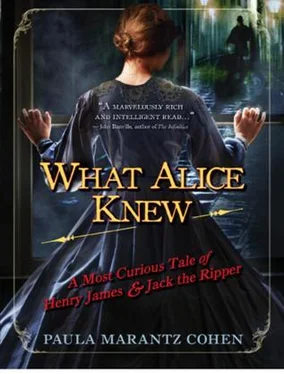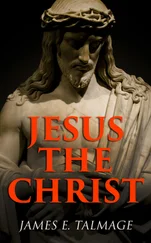William murmured a vague thanks for this piece of wisdom and took a moment to regain his bearings and review what had happened. Looking back and recalling the jolt that had hurtled him into the street, he could not be sure if it was the definite pressure of a hand pushing him forward or merely a jostling elbow or carrying case that some careless member of the crowd had swung in his direction. The whole incident was a blur, though the pressure, as he recalled it, had seemed definite and purposeful. Regardless of its meaning, malevolent mischief or accident, there was no possibility of tracing its source. The crowd in which he had stood had already moved on, and whoever or whatever had pushed him was lost in the vast sea of undifferentiated humanity.
Nora and Henry Sidgwick were waiting for William in the large front room of the Oxford and Cambridge University Club overlooking Pall Mall. Nora Sidgwick, the former Nora Balfour and sister of the eminent politician, was a tireless advocate on behalf of female suffrage. Learned in the fields of history and literature, she had helped found and was about to take on the principalship of Newnham College, the first women’s college at Cambridge University.
Her husband, Henry Sidgwick, was one of the foremost philosophers of his day. Early in his career, he had been a member of the Cambridge Apostles and had broken with the Church of England, but after a short hiatus when he was stripped of his professorship, according to university rules, he had been reinstated as an honorary fellow and then as a chaired professor. He had built his reputation in the field of ethical philosophy, where he had managed to reconcile the utilitarianism of Bentham with the idealism associated with more romantic and aesthetic currents in English thought. But his real interest—if “real” was the proper term for it—was as a founding member and current president of the Society for Psychical Research, the organization devoted to the scientific exploration of spiritual phenomena for which Alice James had expressed so much disdain.
As William entered the room, he noted that the Sidgwicks, whom he recognized from photographs, were seated at a central table and that groups of men at the other tables were glancing in an unfriendly fashion in their direction. There were perhaps four or five such groups, several older, venerable-looking types William vaguely recognized from academic conferences, and some younger ones he imagined to be university men. All were staring angrily at the couple at the center of the room and whispering among themselves.
Spotting William as he approached, Sidgwick stood up and waved a greeting. He was a large, bearlike man with an unruly beard; he seemed to exude goodwill and affability, making the angry stares of his peers that much more puzzling. His wife, Nora, seemed equally pleasant, if less effusive. She was a small, delicately pretty woman some years younger than her husband, with an alert, confident manner. Neither, however, seemed to notice William’s disheveled appearance or the fact that he had a large mud stain on his sleeve. It struck him that it was typical of such people, their minds fixed on the larger issues of philosophy and social justice, to miss the details of ordinary life. He had been prepared to discuss the accident that had sent him practically under the wheels of the curricle, but it seemed that he would not have to do so. He was grateful for that, for he was eager to put the incident out of his mind.
He shook Sidgwick’s hand warmly and congratulated Nora on the strides she had made in the area of female education. It was a cause that he publicly championed but privately questioned. He knew that his sister would have benefited from such opportunities, but then, she was the exception. His wife, like most women he knew, preferred her quiet, domestic role to a larger, more active one, which was just as well; how could he do his work if she had research of her own? It was a selfish thought, but he would not feel guilty for it.
As he sat down with the Sidgwicks, he noted that the other members of the club continued to glare in their direction. He could only imagine that they were registering their distaste for Sidgwick’s spiritualist interests, though the thought struck him as odd. Since when would such an interest provoke animosity? Ridicule, yes; scorn, possibly, but venom?
“Have a cognac,” said Sidgwick cheerfully. “Or better, a whiskey. That’s what I’m drinking. You need it to fortify yourself against the rancor that surrounds us.”
“But why such rancor?” asked William. “You and Nora are respected figures in your fields. I’d think they’d be eager to talk with you.”
“Normally they would be,” said Sidgwick blithely, “but not now. It’s Nora’s presence in this room that enrages them. The Oxford and Cambridge Club has been designated an all-male bastion, and she refuses to honor the gentleman’s code.” He pointed to a youth in livery cowering in the corner. “When the waiter over there politely informed her that ladies were not welcome, she told him that he would have to call a constable if he wished to remove her.”
William nodded. It was clear now. He knew, from experiences in America, that the female issue was a lightning rod among even the most enlightened men, for whom superiority to the other sex was the one thing to which they felt entitled; their very definition of masculinity seemed to turn on it. He sometimes wondered if it was a requirement of a democratic nation to maintain this one site of hierarchy as a kind of structural support, much as a house must have one weight-bearing beam. From a rational point of view, of course, it was nonsense, as oppressive and unfair as any other sort of enforced hierarchy, but as a practical fact, he had sympathy for it, if only because his gender disposed him that way. “Is it in the club bylaws to exclude women?” he asked. He was used to the reflexive tendency to invoke university regulations as though they were universal laws.
“It is,” responded Sidgwick, “and this is precisely what Nora hopes to change. The club was formed to serve the graduates of Oxford and Cambridge. Newnham is Cambridge’s first female college, just as Girton is Oxford’s, but the bylaws have not been amended to reflect this, and Nora, as head of one of these female institutions, protests the fact strenuously.”
Nora, who sat by while her husband explained her position, did not appear to be protesting strenuously, but she did look very charming as she nodded in agreement. “I stumbled on the idea while reading your Henry Thoreau,” she said languidly. “He refused to pay his taxes. I’m acting on the same principle.”
“Not an exact analogy,” acknowledged Sidgwick, “but close enough.”
“Henry Thoreau went to jail,” noted William.
“Nora’s intention precisely,” said Sidgwick. “She feels it would be good publicity for the movement. Unfortunately, she can’t get anyone to arrest her.”
“Englishmen are cowards,” explained Nora. She glanced around the room, and the men who had been staring at her immediately averted their gazes.
“We British tend to hope the cold shoulder and the venomous stare will do the work of prescribed legislation, which is why reform grinds exceedingly slow in this country,” said Sidgwick.
“Since I don’t think they have the courage to arrest me, I might as well leave,” said Nora, sighing. “It’s a pleasure to meet you, Professor James. I look forward one day to meeting your wife. Perhaps you will visit us in Cambridge. The Newnham girls are very good with children, so she could rid herself of the albatross of childcare and enjoy herself.”
William assured her he would relay the message, wondering whether his Alice had ever considered childcare to be an albatross.
Читать дальше












